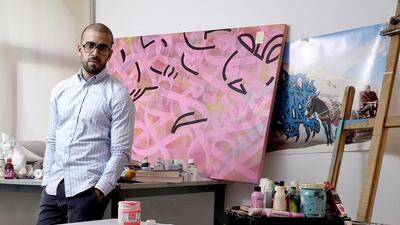In a small corner of the Tunisian Sahara desert, north-west of the city of Tozeur, lies the fictional home of Luke Skywalker, a planet named Tatooine. The old Star Wars set, built in 1976 by George Lucas, remains intact as per the direction of the Tunisian government and thousands of tourists visit each year.
What those fans probably don’t know is that Lucas took the name for his Jedi planet from another Tunisian town, Tataouine, in the south. It is an ancient Berber settlement filled with ksar, fortified castles, of which only a few are being protected by the government and the rest left to contend with the destructive forces of nature.
On a trip back to his homeland eL Seed, a French-Tunisian street artist, became indignant when he discovered this.
So he visited the film set and after taking permission from a sleepy security guard, took a black spray can and wrote on one of the walls in beautiful Arabic calligraphy “I will never be your son,” leaving the cultural reference as self-explanatory.
“I have nothing against George Lucas,” he explains. “But I don’t see how that can be a genuine part of our culture when they are neglecting our real heritage.”
Whether the graffiti remained or whether it was painted over is beside the point, eL Seed continues, because the documentation of it exists. The image and the story is just one of the compelling entries in eL Seed's book Lost Walls, set to be released later this year.
The book was made after a one-month trip to Tunisia that the artist made in August last year with a team of six videographers and photographers as a way of showing another side to the country.
“In Tunis we used to have mass tourism that revolved around sandy beaches, souqs and nightclubs. Then, after the revolution we had revolution tourists.
“I wanted to show the other stories. We have a history much deeper than you see in the media, so I wanted to bring back some of the cities that were totally forgotten and to focus on anonymous people who had something to say,” he says.
eL Seed, who was born and raised in Paris and later moved to Montreal, rose to prominence in 2012 when he painted the minaret tower of a mosque in his family town of Gabès. For the project, which was supported by Sharjah’s Barjeel Foundation, he chose a verse from the Quran and painted in his own style of distinctive calligraffiti.
People related to it because of its universal message, explains the artist, who is currently in the middle of a year-long residency at Dubai’s Tashkeel studio hub.
It is a message that he has tried to continue in the book.
“I carry my tradition and my own culture but I present it in a new way,” he says. “I am trying to use Arabic to bring a universal message that anyone can relate to.”
Although his messages are in Arabic, they are not supposed to connote any links to religion, something that people always associate with calligraphy.
One of his most common phrases that he writes is “love is the miracle of civilisation”, which aptly summarises what eL Seed is about.
He never signs his name, as is common with most graffiti artists, and he doesn’t want anything from it.
“I own the space while I am doing the wall but afterwards I leave it for the public. The focus is not on me, it is on the content of the message.”
In Lost Walls, he selects sites of dilapidated railway stations, dry salt lakes, mountains and an abandoned town called Djerrissa, which used to be one of Tunisia's richest towns due to its concentration of iron ore.
“There was a story in each town. We arrived, we didn’t know people but they so were happy that we came and were interested in what we were doing. Every single one was inspiring and every wall that I painted is a visual ode of one of these meetings.”
The book, filled with those images and stories, is also peppered with a series of essays from other artists, scholars or those in the tourist industry, addressing subjects like the democratisation of art and the responsibility of the artist in Tunisia.
Published by From Here to Fame and with a stunning foreword by Jeffrey Deitch, the former director of MOCA in Los Angeles and curator of one of the first calligraffiti shows in the 1980s, Lost Walls will be launched next month during Art Dubai, for which Deitch and the artist will give a public talk. The book will be released globally and on Amazon at the end of April.
“This is Tunisia seen from another angle,” concludes eL Seed, who finishes with a quote from Salah Souai Marzougui, an artist he met in the town of Douz: “Sometimes you need someone from outside to tell you how beautiful you are.”
• For more info on the artist and his projects, visit www.elseed-art.com.
� aseaman@thenational.ae

